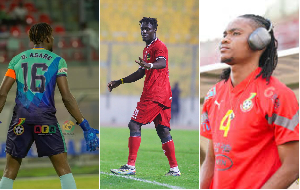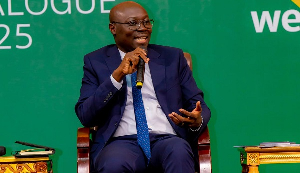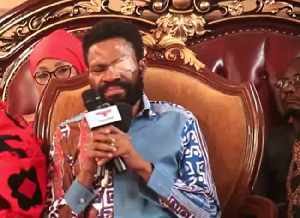Growing up in Bole’s Nyimage suburb, I had often been compared with a man whose name I heard only on the lips of those who sung his appellations and praises. I was not timid, but I certainly was that young child who everyone was comfortable to ask to run errands for. To say no to an elder, for me, marked the epicentre of disrespect. And so if you were to send me to fetch you some kola-nuts in the market square and I met uncle Mahama enroute who wants me to buy him some tobacco from the corner, I would happily take uncle Mahama’s order in addition to yours. I would do everything in my power to ensure that both orders were carried out and delivered satisfactorily.
Of the many children in the house, I was the one everyone would ask to write them that letter that is to be sent to that brother, uncle or sister in the “Big City”. This was not only because I was the only one who could write in the Queen’s language, but more so because I was the one to be trusted with one secret or the other. Each time I delivered on whatever assignment I was given, I would be praised and told how similar I was to “Nuhu” (as Prof Nuhu Zakari was affectionately called).
Each time I came first in class, I would be told how “Nuhu” was that good when he was in Ghana. His mum, my aunty, would always look at me with admiration and never in my 10-year stay in Bole did she ever say anything to upset or offend me. For her, I was the exact replica of her beloved son who was in a far away Cuba “in search of knowledge”. I would be told how “burnyan” (Gonja word for “respect”) would take me places and how I must keep it up. And up, I tried to keep it. As many times as similitudes were drawn between me and “Nuhu”, as many times, I was keen to know more about this individual.
There was no Facebook or Whatsapp at the time for me to try and figure out how this young man looked, but I was keen to learn more about him. All I knew was that he had won a scholarship and had gone to Cuba to further his studies.
The opportunity for me to know him came sometime in 1996 on the day I was leaving Bole for Kumasi. Donning a white shirt, he spoke gently and humbly in a way that immediately endeared him to me. At that instant, I got to understand why many sung his praises. But that encounter in Bole’s market square was brief as it could possibly be but that impression, the very first impression, lasted. I didn’t see Prof Nuhu again until in 2011 when I visited him in his office.
Understandably, he didn’t recognise me but the reception was warm and heartfelt. While I was away in England, I had heard from many people how “Dr Nuhu” (he became Professor, relatively recently) was leaving no stone unturned in helping the youth gain some employment. I heard about his sterling work with Ghana’s National Health Service and the Ambulance service in particular.
I was in a friend’s car one day when a lady by the name Ewurama called to thank my friend for introducing her to Prof Nuhu and how, following her employment, had just been paid her first salary. I later learnt that Ewurama, until Prof Nuhu offered her a job with the Ambulance service, had resigned herself to motherhood (giving birth to 3 children in a spate of 5 years).
With no uncle or aunty in any high place in Ghana to “push” her job applications beyond the corridors of the receptionists, and with 3 children to look after, Ewurama was literally living on handouts until my friend (one of those who gave her the handouts) introduced her to Prof. I understand (from my friend) that when Prof saw her grades, he was a little hesitant to proceed with her application.
But all that changed when Prof asked her a question. The unparalleled accuracy of her grammar coupled with the exactness of her answers might have made Prof Nuhu (a medical practitioner) to assume that the only explanation for Ewurama’s poor grades may be poverty or some form of dyslexia (assuming Ewurama had dyslexia, in some jurisdictions she would have been looked at as such and given the necessary support, rather than “chucking her away”).
Either way, Prof probably thought that he could relate to that and hence took the risk and offered Ewurama a job. As I write this, I am aware Ewurama has recently bought a parcel of land in her native Obuasi, ready to start building. She now sees Prof Nuhu as her “God” without whom her manna would have remained hanging in the clouds.
But while this young lady(like many others) is singing Prof’s praises, little did she know or understand why the man would have extended such a hand of magnanimity and generosity to what many will consider to be complete stranger.
Coming from a relatively poor background, Prof Nuhu (for those of us who know him) knows too well how it feels like to be without. He believes, and rightly so, that the first step towards emancipating oneself out under the shackles of economic subjugation is for one to be in a position of economic independence. He doesn’t believe in servitude in tranquillity. He believes (and rightly so) that you don’t emancipate people out of economic servitude by feeding them the metaphorical fish. He would give you the fishing net, the hook, the line, the sinker and the bait to go and catch your own fish so that in future when he is not there to give you that fish, you would be able to go out there and get your own fish. And that for me is what everyone in a relatively better position should be doing rather than giving handouts.
When I heard that Prof Nuhu Zakari was planning to enter into the muddied political waters of Ghana, I was momentarily taken aback. I thought to myself, why would an accomplished academic and medical practitioner of his calibre and standing want to expose himself to the rather amateurish politricks of Ghana. That question and thought, arguably however, is loaded with assumptions that political office comes with some largesse which largesse he supposedly doesn’t need (given his accomplishments).
And so when I met him in December 2014 and posed the same question to him, his response (quoting Bob Marley) was that: “the greatness of a man is not in how much wealth he acquires, but in his integrity and his ability to affect those around him”.
For Prof Nuhu, there are so many challenges in the Bole-Bamboi constituency that require a hands-on approach to dealing with them. Given his accomplishments at the National Ambulance Service especially with respect to engaging with the youth, there is no scintilla of doubt that he will be able to deliver on a relatively smaller agenda at the local level.
While relatively small, the bigger agenda however, lies in filling John Mahama’s rather large shoes left in Bole and it will take a man with the tenacity of purpose and industry like Prof Nuhu Zakari to do it.
As Bole-Bamboi (NDC) goes to the polls, it is my hope that we will see beyond the narrow confines of our political differences and vote Prof Nuhu into office so that he can deliver on his vision of a Bole that has seen so many rivers flow by and yet had had to wash its hands with spittle.
Long Live Ghana!!!
Long Live NDC!!
Long Live Bole-Bamboi!
Opinions of Wednesday, 9 September 2015
Columnist: Adam, Sheriff



![New IGP, COP Christian Tetteh Yohonu [L] and immediate-past IGP, Dr. Akuffo Dampare New IGP, COP Christian Tetteh Yohonu [L] and immediate-past IGP, Dr. Akuffo Dampare](https://cdn.ghanaweb.com/imagelib/pics/140/14041582.295.jpg)











